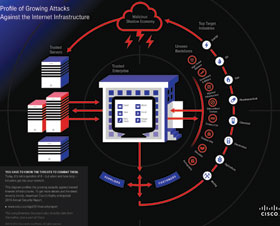

South African businesses face unprecedented levels of cyber-attacks, as global security vulnerabilities and threats against systems, applications and personal networks have reached their highest-ever recorded level, Cisco has announced in the Cisco 2014 Annual Security Report.
In the rapidly evolving world of security threats, total global threat alerts increased 14% year-on-year from 2012 to 2013. Around the world, a sample of 30 of the world’s largest Fortune 500 companies generated visitor traffic to websites that host malware, with global energy, oil and gas sector seeing a sharp rise in malware attacks.
“Organisations across the Middle East and Africa must realise that it is no longer if they will be targeted by cyber attacks, but rather when,” says Greg Griessel, consulting systems engineer Security Solutions, Cisco South Africa. “Chief information security officers face growing pressure to protect terabytes of data on an increasingly porous network, manage information safely especially on the cloud and evaluate the risks of working with third-party vendors for specialised solutions – all in the wake of shrinking budgets and leaner IT teams.”
The Middle East and Africa region is posting strong adoption of smart devices, set to grow from 133 million in 2013 to 598 million in 2018, and cloud computing, set to post the world’s strongest cloud traffic growth rate from 17 exabytes in 2012 to 157 exabytes in 2017, according to Cisco.
However, while increasing mobility is rapidly enhancing daily lives and businesses, it is also driving more complex security threats and solutions. As a result, cybercriminals are increasingly attacking Internet infrastructure rather than individual computers or devices, with password and credential theft, hidden-in-plain-sight infiltrations, and breaching and stealing data.
Additional survey findings
The Cisco 2014 Annual Security Report also flagged up a host of troublesome trends, including Android mobile devices bearing the brunt of 99% of all mobile malware, Java being the most frequently exploited programming language, and multipurpose Trojans counting as the most frequently encountered Web-delivered malware.
Specific business sectors besides energy, such as pharmaceutical, chemical, electronics manufacturing, agriculture and mining are showing a sharp rise in malware attacks.
Furthermore, the report indicates a shortage of more than 1 million security professionals across the globe in 2014, as most organisations do not have the people or systems to continuously monitor extended networks or detect infiltrations, and then apply protections in a timely and effective manner.
New advanced malware protection
Anticipating the high demand for state-of-the-art security solutions, Cisco and its company Sourcefire have fully integrated the Advanced Malware Protection solution into Cisco’s Content Security Portfolio of products, including Web, Email Security Appliances, and Cloud Web Security Service, to protect the more than 60 million enterprise and commercial users who use Content Security solutions.
Advanced Malware Protection’s effectiveness draws from integrating Cisco and Sourcefire cloud security intelligence networks in order to detect and protect against cyber-attacks. The solution also evolves to provide continuous monitoring and analysis across the extended network before, during, and after an attack, along with retrospective remediation of advanced threats.
By combining Sourcefire’s knowledge of advanced threats and analytics expertise with Cisco’s Email and Web Security solutions, customers benefit from visibility and control, combined with a cost-effective, seamless approach to addressing advanced malware problems.
“In order to restore trust in people, institutions, and technologies, our Advanced Malware Protection solution empowers defenders with real-time knowledge about expanding attack surfaces, and provides our customers with the best advanced malware protection – from the cloud to network to endpoint,” concluded Griessel.
Download the report at www.cisco.com/web/offers/lp/2014-annual-security-report/index.html

© Technews Publishing (Pty) Ltd. | All Rights Reserved.